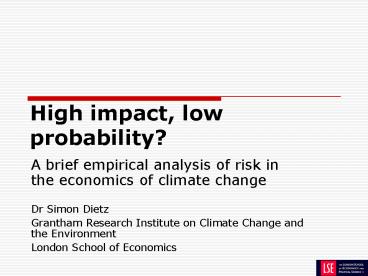High impact, low probability
1 / 15
Title:
High impact, low probability
Description:
Compare truncated Stern Review pdf with lognormal distribution fitted over ... Stern. Stainforth. Change in climate sensitivity pdf. Change in expected welfare ... – PowerPoint PPT presentation
Number of Views:529
Avg rating:3.0/5.0
Title: High impact, low probability
1
High impact, low probability?
- A brief empirical analysis of risk in the
economics of climate change - Dr Simon Dietz
- Grantham Research Institute on Climate Change and
the Environment - London School of Economics
2
This paper
- The question
- To what extent do the results of CBA of climate
change depend on low-probability, high-impact
events? - The approach
- Intuitive empirical analysis with an integrated
assessment model (PAGE) - The answer
- Results strongly depend on tail risks, but for a
set of plausible assumptions discounting still
matters - The intuition
- Tail risk of (arbitrarily) huge losses in utility
- But (by definition) not very likely and very far
off (t2100)
3
Weitzmans four exhibits
- Exhibit A geologically instantaneous pulse of
greenhouse gases - OK SRES and post-SRES BAU scenarios fit the bill
- Exhibit B long-tailed climate sensitivity
- Problem usually deterministic, or sampled from
distribution with relatively low (and finite)
upper support - Exhibit C significant positive feedback from
carbon cycle - Problem often ignored in modelling, sometimes
included but perhaps not on an adequate scale - Exhibit D welfare loss from extreme warming
- Problem? Depends on assumption (can assume
anything), but most models have quadratic loss
function or less steep
4
Modelling strategy
- Emissions
- Non-probabilistic in PAGE (2002 version). Use A2
scenario (high emissions) and compare BAU with
550 stabilisation - Climate sensitivity
- Compare truncated Stern Review pdf with
Stainforth et al. pdf from climateprediction.net - Carbon cycle feedbacks
- Probabilistic natural stimulation of CO2 in PAGE
- Loss function
- Compare truncated Stern Review pdf with lognormal
distribution fitted over minimal a priori
assumptions
5
Climate sensitivities compared
6
Loss functions compared
7
Probability of catastrophe
8
Probability of catastrophe BAU
9
Probability of catastrophe 550
10
Dependence on arbitrary upper bound
11
The intuition
- For a CRRA utility function with strictly
positive relative risk - aversion, marginal utility tends to infinity as
consumption tends to - zero
12
Social cost of carbon as a function of the
arbitrary upper bound
13
Sensitivity to risk and discounting
14
Sensitivity to risk and discounting similar
magnitudes
15
High impact, low probability?
- A brief empirical analysis of risk in the
economics of climate change - Dr Simon Dietz
- Grantham Research Institute on Climate Change and
the Environment - London School of Economics































